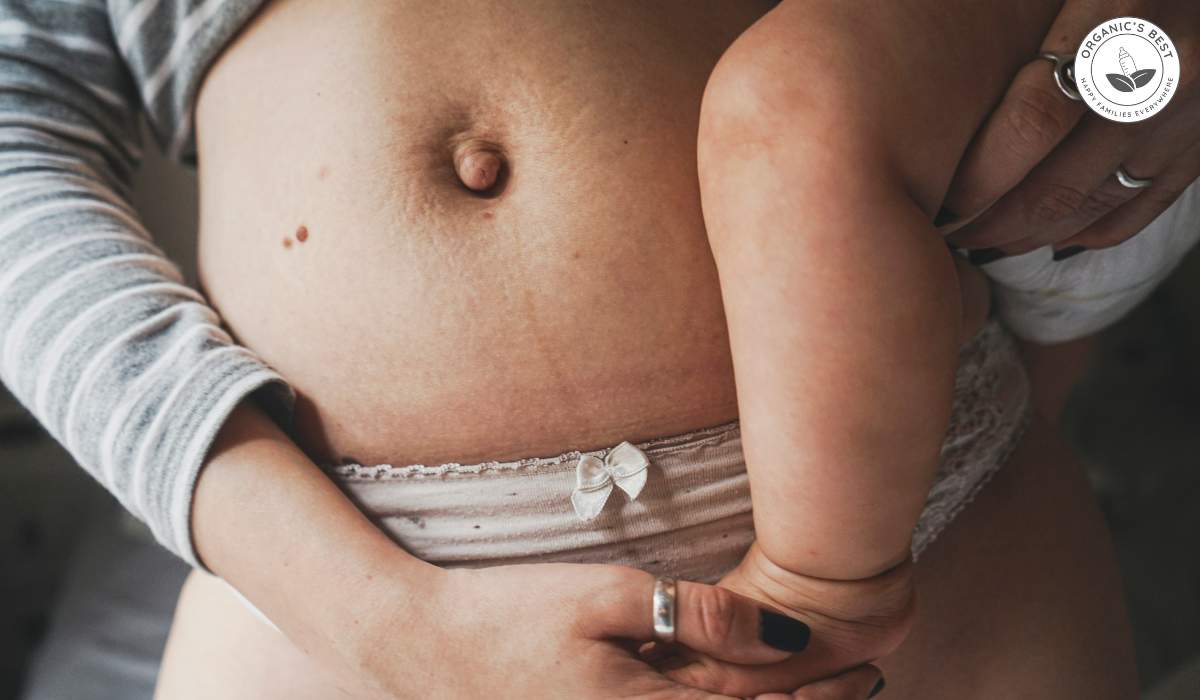Click to Get 2 FREE Boxes/Cans
Only New Customers! Click HERE to Get 2 Extra Boxes/Cans for Free With Your First Order.
BABY FORMULA
Offering new parents top-quality European infant formula from renowned brands like HiPP, Holle, Kendamil, and more. If you’re uncertain about which product to choose, our Formula Finder can help you make the best decision for your baby.
Baby Food
Offering new parents a premium selection of European baby foods, including jars, pouches, cereals, and snacks from esteemed brands like HiPP and Holle.
Best Formula for Gassy Babies: Top Picks and Tips
by Agustina Fernandez November 05, 2024 8 min read

If you've landed here, odds are your once peaceful baby coos have been replaced with some serious grunts and groans-and you're looking for answers. When your little one is continuously displaying signs of discomfort after feedings, gas may be the culprit.
A baby's sore tummy often leads to squirming, fussing, and tears, which can be stressful for parents. But don't worry, you're not alone, and there are plenty of ways to help soothe these tummy troubles!
Let's examine how to spot signs of gassiness, soothe a gas-filled tummy, and select the best formula for your gassy baby.
Table of Contents
- How to Tell if Baby is Gassy
- How to Help a Gassy Baby: Helpful Tips
- Our Formula Options for Gassy Babies: Goat Milk & Hydrolyzed Milk & Hypoallergenic
- Goat Milk Formula: Holle & Jovie & Nannycare
- Hypoallergenic Formula: HiPP HA
- Special Formula: HiPP Comfort
- Signs That a Formula Change May Be Necessary Because of Gas
- Answering Your Questions on Baby Gas
- Choosing the Right Formula for Gassy Babies
How to Tell if Baby is Gassy
Understanding your baby's cues isn't always easy, especially with all the common issues that pop up in the first year. So, how can you tell if gas is causing your little one's discomfort?
Well, babies can't exactly say, "Hey, Mom, I have a ton of gas in my belly," but they have their own ways of letting us know what's going on through various behaviours that are often pretty easy to spot.

Look for these telltale gassy baby symptoms:
-
Frequent Fussiness
Every parent expects a little fussing, but a gassy baby takes it to a whole new level. If your baby seems generally unhappy, especially after feeding, gas might be the culprit. While a little gas in babies is completely normal, excessive gas will likely result in many grunts, groans, and tears.
-
Difficulty Feeding and/or Sleeping
If your little one is having trouble latching during feeding, they might be taking in extra air, which can lead to a buildup of gas. So, if you notice feeding difficulties along with other signs of a gassy baby we've mentioned, gas might be the culprit. Plus, when bedtime rolls around, those trapped bubbles can make lying flat uncomfortable, leading to more frequent wake-ups or difficulty settling down for the night.
-
Crying for Long Periods of Time
Crying is a normal part of being a baby, but when those cries turn into prolonged, frantic episodes, something more might be going on. If gas is the issue, you may notice your little one turning bright red and more frantic movements like legs pumping in tiny bicycle kicks.
-
Grunting and Turning Red
It might seem cute when babies grunt, but if they're straining and turning red, it's one of the main signs baby is gassy and experiencing discomfort.
How to Help a Gassy Baby: Helpful Tips
We've covered signs of gassy baby; now, let's look at how to provide baby gas relief. While there's no magic wand, there are some tricks that could relieve some of that gas and ease your mind, too. Here's 7 tips on what to do for gassy baby:
-
Burping - An infant with excessive gas may require extra burps throughout feeding time. If you're used to just burping them after a feed, try stopping the feed halfway through for an extra burping session. This can help because babies can gulp in air during feeding, resulting in trapped bubbles that can turn into gas.
-
Tummy Time - Besides being a great way for them to build strength, tummy time can help your baby move that gas along. Let gravity lend a hand by giving them some belly-down time after feeding (but don't lay them down immediately - wait 20 minutes if you can).
-
Infant Massage - Massaging your baby's belly in gentle circles, particularly around the lower abdomen, can help release that trapped gas. Try a gentle clockwise motion - it's like a little spa treatment that'll help those bubbles go down!
-
Feeding Position - Hold your baby at a slight incline during feeding to help prevent them from swallowing too much air. A simple 45-degree angle can make a huge difference in their comfort levels post feed.
-
Baby Probiotics - Probiotics can encourage a healthy balance of bacteria in your baby's gut, which may help with digestion. Always talk to your pediatrician first, but some probiotics are gentle enough for babies and could be the digestive boost they need. Baby formula for gassy babies often includes probiotics.
-
Choosing the Right Bottle and Nipple - If your baby is bottle-fed, choosing a bottle designed to reduce air intake is a game-changer. Look for anti-colic bottles or slow-flow nipples that prevent gulping. They may cost a bit more, but they're worth every penny for a peaceful feeding experience.
-
Avoiding Overfeeding - Follow your baby's hunger and satiety cues. Overfeeding can lead to a bloated belly and extra gas, but underfeeding or limiting feeds too much is also problematic. Finding the right balance can take some trial and error, but offering smaller, more frequent feeds can help.
And remember: finding gas relief for babies isn't a one-size-fits-all solution. You may need to implement various techniques for reducing gas before you find one that works.
However, if you've tried everything and it just seems like that pesky gas isn't going anywhere, reach out to your pediatrician for personalized guidance. They will also be able to tell you when to switch formula because of gas, offer advice on how to make the switch, and help you discover the best formulas for gassy babies.
Our Formula Options for Gassy Babies: Goat Milk & Hydrolyzed Milk & Hypoallergenic
Sometimes, despite all your best efforts, the formula just isn't quite right for your baby's tummy. Here are some of the best formula for gas.
Each best formula for gassy baby is crafted with sensitive digestion in mind. While a switch in formula can take a bit of time to show results, these options may provide relief where regular formulas fall short.
Goat Milk Formula: Holle & Jovie & Nannycare

Goat milk formulas are known for their A2 proteins, which are gentler than the A1 proteins in cow's milk, making them well-suited to sensitive tummies.
Additionally, goat milk has up to 10% more oligosaccharides than cow's milk, serving as a prebiotic that promotes digestive health in sensitive stomachs. Prebiotics are also known to enhance bowel movements and may provide gassy baby relief, making goat's milk formulas some of the best baby formula that helps with gas.
Here is a list of the best formula for babies with gas.
Holle Goat
Holle has established a strong legacy in baby nutrition, specializing in organic goat milk formulas for over 20 years, and is recognized for its high-quality products designed for sensitive stomachs.
Impressively, the brand was a pioneer in obtaining Demeter certification, ensuring that its goat milk is sourced from certified organic German farms and minimally processed to preserve nutritional value.
This formula comes in two variations: Dutch and German. Holle German is offered in Stages PRE-4 in 400g boxes, while the Dutch version is offered in Stages 1-3 in 800g cans.
Jovie Goat
Jovie Goat is one of the best formulas for gassy babies and is celebrated for its natural, minimally processed recipe that enhances digestion.
The formula contains less inflammatory A2 proteins and easy-to-absorb short-and medium-chain fatty acids, promoting healthy digestion. It is free from starch and maltodextrin and uses lactose as its primary carbohydrate source.
Sourced from European organic farms, Jovie goat milk is screened for antibiotics and hormones, ensuring a clean composition, and fortified with bioavailable nutrients like iron and zinc for optimal absorption.
Nannycare Goat
With a 30-year history in crafting infant formula and a commitment to sustainability and quality, Nannycare provides a reliable alternative for parents seeking goat milk options for their children.
Nannycare prioritizes quality by closely monitoring every aspect of their goat milk formula production, from selecting the best goats to feeding them natural diets and using milk transportation methods that maintain nutritional integrity.
Their formulas are available in three developmental stages. They are gently processed to preserve natural nutrients and result in a creamy, easily digestible, gassy baby formula.
Hypoallergenic Formula: HiPP HA

If you suspect that cow's milk protein may not be agreeing with your baby, HiPP HA might be the answer. It is hydrolyzed, which means the proteins are broken down into smaller bits, making them easier to digest and less likely to cause a reaction.
Special Formula: HiPP Comfort

Sometimes, sensitive tummies need something truly tailored. HiPP Comfort is a special formula designed to address colic, constipation, and gas. It uses hydrolyzed proteins and prebiotics to help establish a healthier gut and is some of the best baby formula for gas.
Signs That a Formula Change May Be Necessary Because of Gas
Not every formula agrees with every baby. Here's when you might want to consider switching:
-
Frequent Fussiness or Crying: If your baby seems perpetually fussy and you're seeing no improvement, it's worth re-evaluating their formula.
-
Gas and Bloating: Sometimes, gas is so persistent it causes noticeable bloating. If your baby's belly seems distended or uncomfortable, a gentler formula may be a solution.
-
Digestive Irregularities: If you're seeing consistent diarrhea or constipation, it's possible that the formula could be impacting their gut health.
-
Refusal to Feed: When babies find formula uncomfortable to digest, they may start to refuse it. If they're showing hesitation, they may be trying to tell you something.
Switching formulas isn't always easy, and you may need to give a new formula a week or two for your baby's digestive system to adjust. Parents should transition gradually by mixing the old and new formulas in certain ratios over a few days. Keep an eye on how your baby responds by keeping a feeding and symptoms diary to track progress. If you don't notice any improvement, consult your pediatrician again.
Answering Your Questions on Baby Gas
Here are the answers to some of your most frequently asked questions.
Does Warm Formula Help with Gas?
Yes! Warm formula can be gentler on the stomach since warmth aids digestion. Try warming your baby's formula to body temperature - it can relax their tummy muscles and ease some of that pressure.
Does Cold Formula Cause Gas?
Cold formula isn't necessarily the enemy, but some babies are more sensitive to temperature. Cold formula might take a bit longer to digest, so if your baby is gassy, warming it slightly can help.
Does Formula Make Babies Gassy?
All formulas can cause some gas because a baby’s digestive system is still maturing. Hypoallergenic, goat milk or specialized formulas might reduce symptoms in some cases, but results vary by infant because different babies have different reactions to formula ingredients.
Do Pacifiers Cause Gas?
Pacifiers themselves don't cause gas, but if your baby tends to gulp when sucking, they might swallow some air. Just make sure they're using it calmly, and you should be in the clear.
Choosing the Right Formula for Gassy Babies
In the end, the right formula can bring peace to both you and your baby - creating a more comfortable, happy feeding experience for everyone.
So, if you suspect that the infant or newborn gas is a result of formula then opting for a goat milk formula or a specialized formula may provide much needed relief.
Remember that if gas and tummy troubles are ongoing despite your efforts, it's worth checking in with your pediatrician. They can provide guidance on whether a formula switch or other digestive support might be needed.
|
Disclaimer:
Please be aware that this information is based on general trends in babies, and it is not medical advice. Your doctor should be your first source of information and advice when considering any changes to your child’s formula and when choosing your child’s formula. Always consult your pediatrician before making any decisions about your child’s diet or if you notice any changes in your child. Breastfeeding is the best nutrition for your baby because breast milk provides your child with all the essential nutrients they need for growth and development. Please consult your pediatrician if your child requires supplemental feeding. |
Agustina Fernandez
Dr. Agustina Fernandez earned her medical degree from the prestigious Universidad Nacional de Córdoba, Argentina. With a deep-rooted passion for pediatrics, Dr. Fernandez is currently on the path to specializing in children's healthcare. Recently, she has delved into the vital field of infant nutrition. Her research interests include breastfeeding, infant formula, and baby food in little ones’ formative years. Dr. Fernandez's commitment to this area of study underscores her dedication to ensuring the health and well-being of children from their earliest days.
Leave a comment
Comments will be approved before showing up.
Also in Organic Infant Nutrition and Health Blog

Why Having a Baby First Aid Kit at Home Is Important?
by Agustina Fernandez September 09, 2025 8 min read
Read More
What is Tummy Time for Babies? Useful Practice Tips for Parents
by Agustina Fernandez September 02, 2025 8 min read
Read More
Postpartum Care: Key Recovery Tips for New Moms
by Agustina Fernandez August 26, 2025 9 min read
Read More
Reviewed by Dr. Bardha Citaku, MD
-

Dr. Bardha Citaku: Medical Reviewer of Organic's Best Blog
Dr. Bardha Citaku completed her medical studies at the University of Prishtina in Kosovo, where she began her journey into the field of medicine. She has since developed a career in medical research, contributing to projects with notable organizations, including the World Health Organization (WHO).
